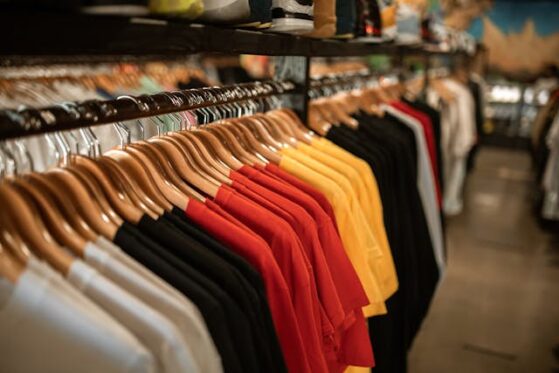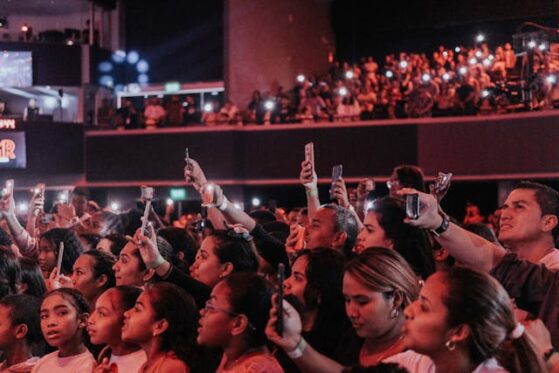I was scrolling through Instagram when a reel from Camille and Kennerly Kitt, known as the “Harp Twins,” popped onto my screen. Titled “Our biggest pet peeves of the music industry,” I was intrigued to listen. They shared this particular peeve was for “when venues and events want to take a portion of our merchandise sales.” Wait, what? Musicians are dependent on live concerts and merchandise to make a living. So how is this fair? “This makes absolutely no sense to us, and it seems just innately so incredibly wrong,” the twins continued.
View this post on Instagram
Comments on the video from other musicians were incredibly supportive and reinforced that this is an unfortunately widespread practice in the music industry. Mairead Nesbitt, famed violinist, Grammy winner, and founding Celtic Woman member, commented, “Completely agree with you! It’s the norm and is really unfair!” This practice also seems counterproductive to the health of the music industry. Here’s why I think venues should not take a cut of artists’ merchandise sales.
Artists Depend on Merch Sales for Financial Stability
We unfortunately live in an era where streaming revenues are notoriously low (giants like Spotify pay around $0.005 per stream). Merch sales have become a crucial revenue stream for artists. Physical merchandise such as signed CDs/vinyl records, posters, t-shirts, and other items not only provide fans with a tangible connection to the music they love but also help artists cover their expenses and sustain their careers. Despite what Spotify CEO Daniel Ek claimed, the cost of creating music is not “close to zero.” Jennifer Thomas, who we spoke to about her epic new album “Oceans,” took to social media to share that she had spent over $150k of her own money to finance the endeavor… and that’s not even counting the time from the artist.
It’s said Taylor Swift’s Eras tour has made $1 billion in revenue, but for most musicians, especially those not in the top 10% of the industry and headlining stadium tours, merchandise sales could be the difference between breaking even and continuing to make music or having to move into another career altogether. By taking a percentage of sales from items that they have put no backing into, venues are directly undermining the financial stability of the artists who keep their doors open.
One singer from New Jersey shared with us, “Typically, the artist gets offered a ticket split so the venue makes 50% of the sales and the artist takes 50% of the sales. Sometimes that fluctuates, usually in the artist’s favor under certain circumstances. Or the artist is offered a lump sum of money and the venue retains all of the ticket sales. Usually, there are bonus bumps for hitting certain sales markers as well as a sellout bonus. Out of that money, the artist has to pay: taxes, musician fees, travel expenses (hotels, gas, tolls, flights, etc.), rehearsal fees, and sometimes engineer fees (although this is rare). Merch sales are more important than ever these days.”
Merch Is Not the Venue’s Product
Venues provide the space, security, and facilities necessary for concerts to take place, and they are compensated for these services through ticket sales, concessions, and booking fees. However, merch sales are completely separate from this. The design, production, and marketing of merchandise are all handled by the artists and their teams. The venue’s involvement in merch sales is minimal, typically limited to providing a space for a table or booth. Claiming a percentage of these sales is akin to a landlord demanding a cut of a tenant’s side business—it is an overreach into an area where they provide no added value.
The twins referenced a recent contract from a venue that would have taken 20% of merchandise sales, even when they are selling it themselves. “We haul it around, we sell it, and then the venue wants to take a portion of that… I totally understand if a band needs the venue to sell merchandise for them, then of course they have to staff the merch table, etc., but this is if we are selling the merchandise—our own merchandise. That makes just about as much sense as if we require taking 20% of the bar.”
The singer from New Jersey said: “I don’t really think it’s fair given that the venue is already getting a large percentage of the ticket sales. Plus, they retain 100% of any and all food, beverage, and their own merch sales. The artist shares in none of that revenue, and honestly, I wouldn’t expect to share in that, but for some reason we’ve adopted these strange rules that it’s acceptable for the venues to take a piece of our merch sales. So no, I don’t agree with it at all actually.”
Another singer from Canada shared, “Is it fair? If a venue is providing a service, sure I can understand it…but that should also be optional. I think it’s criminal that as indie artists we are the ones fronting the cost of production for our merch, our travel, etc…and then to halve any return we do make because taking a percentage of ticket sales and/or a facility rental isn’t enough for the venue.”
Fair Compensation for Venue Services Should Be Through Transparent Fees
Venues have legitimate costs that need to be covered, including staffing, maintenance, and utilities. However, these costs should be transparently included in the rental or booking fees outlined in artists’ contracts. Relying on a cut of merch sales is unpredictable, creating financial uncertainty for artists. Transparent and predictable fees allow both venues and artists to plan their finances more effectively and foster a fairer working relationship.
A singing duo from the UK shared with us. “We don’t mind a small percentage, but in addition to everything else, it can really add up. Things such as ‘restoration levies’ on ticket prices, credit card fees, etc., all come off the ticket price and go to the theater before any split is made. We’re lucky to get about half of the price of each ticket.”
Merch Sales Drive Fan Engagement and Loyalty
Merchandise is more than just a revenue stream; it is a vital part of fan engagement. Fans wear their favorite band’s t-shirts proudly, hang posters on their walls, and cherish vinyl records. By taking a cut of merch sales, venues are effectively taxing the relationship between artists and their fans. This can lead to higher prices for merch, which might deter fans from making purchases and which deprives both artist and fan. Artists thrive on the loyalty and support of their fans, and merch is a key component of that bond.
Supporting Artists Benefits the Entire Industry
The opposite side of course can argue that venues are also struggling, and there’s no doubt that’s true. We all are struggling. However, the fact of the matter is when artists thrive, the entire music industry benefits. Healthy merch sales can support artists’ ability to produce new music, put on live shows, and tour more extensively. This, in turn, draws more fans to concerts, benefiting venues as well. By refraining from taking a percentage of merch sales, venues invest in the long-term viability and growth of the music ecosystem. It’s a win-win scenario where artists can sustain their careers, fans get the merch they love, and venues continue to host exciting, well-attended shows.
What can artists do to fight back?
Fortunately, at least for Camille and Kennerly, there have been opportunities to fight this. The twins shared, “We have never once taken a gig or an event where they take a percentage of our merchandise, and neither should you. It’s time to stick up for yourselves and say enough is enough.” They also stated that when clearly stating this was a “deal breaker” for them, venues have come around.
It’s promising to hear this, however I understand that not every artist may be in the position to bargain, especially those who are just coming up and lucky for any gig. However, even having awareness about the issue can help prepare musicians to negotiate when the time and circumstance permits. As fans, you can make a difference by supporting artists when they are performing live and for free on their social media accounts and streaming services. If this beloved music industry is to survive, we need to prioritize the welfare of the artists who bring life to our stages and joy to our lives.
If you think the practice of venues taking a percentage of artists’ merch sales is a relic that needs to be reconsidered, please comment below. If you’d like to submit an article about your own industry pet peeves, please reach out to us.












